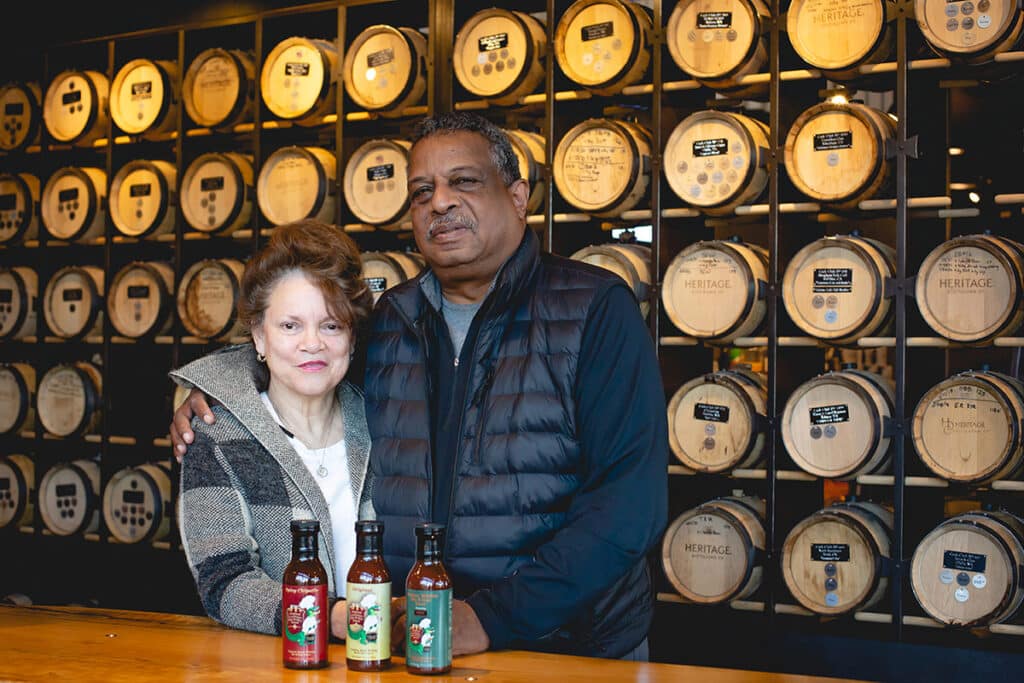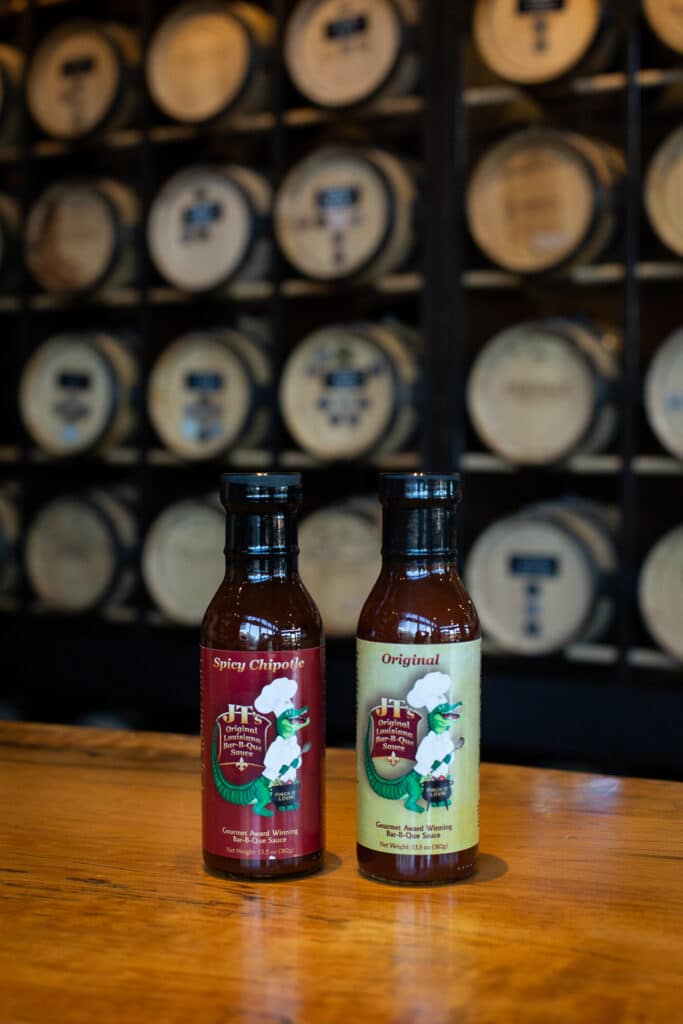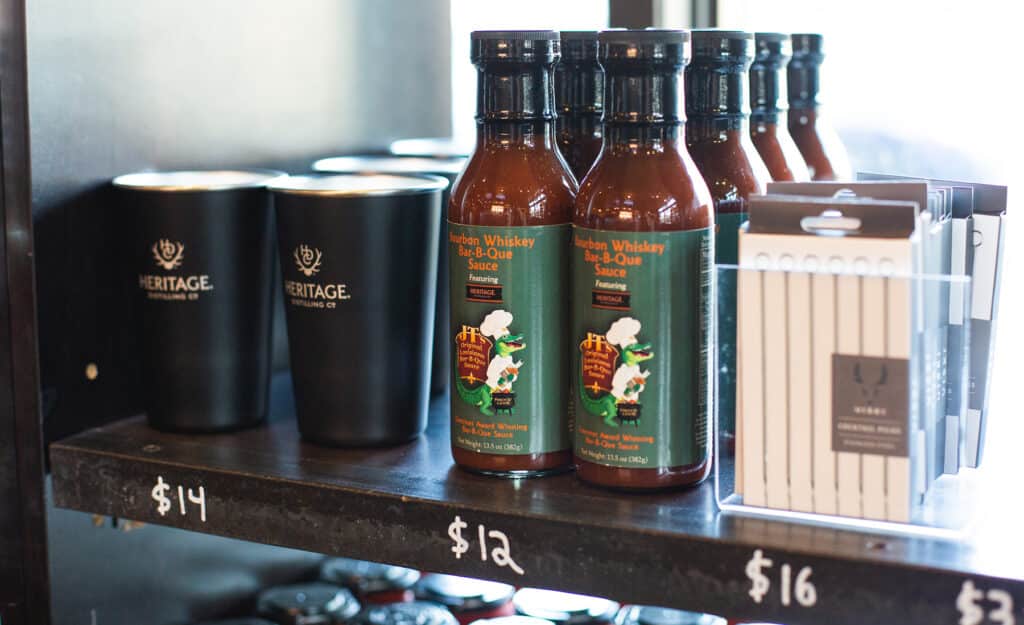Business Community
Business Spotlight: Gig Harbor family brings Louisiana flavor to the Northwest
“It’s not too hot, but still has a lot of flavor,” says Elsie.
“It comes from a place of love,” adds her husband James.
Heat, flavor, and love: the ingredients of JT’s Original Louisiana Bar-B-Que sauce.
Longtime Gig Harbor residents Elsie and James “JT” Turner founded their company rooted in family love and the generational flavors of their Louisiana mothers.
The barbecue business begins
After returning home from the Vietnam War, James’ brother Dan was unable to find a job. Soon after, Dan’s life would spiral down.
Dan needed opportunity and hope. Because he loved to barbecue, James and Elsie decided to open a barbecue catering business to provide Dan with a place to work doing something he loved.
But tragedy struck shortly after the startup opened its doors. Dan and his sister, Rena, were killed in an auto accident.
Honoring Dan’s legacy and inspired by their family’s Southern culinary roots, the Turners kept the business going. In 1998 they opened JT’s Original Louisiana Bar-B-Que restaurant in Gig Harbor. They later opened a restaurant in Tacoma, followed by an expansion in Newark, New Jersey, where their daughter worked for then-mayor (and now U.S. Sen.) Cory Booker.
Eventually, however, the Gig Harbor couple decided to refocus their business solely on barbecue sauces back home in the Pacific Northwest.

Elsie and James Turner, owners of JT’s Original Louisiana Bar-B-Que, in Heritage Distilling’s tasting room recently. The Turners grew up in rural Louisiana and their sauce blends the cooking styles of their mothers.
From Louisiana to Washington state
James and Elsie Turner first moved to Washington state in 1985 with their four children. They eventually landed in Gig Harbor in the mid ’90s. After working in construction management for the city of Seattle, James began his second career as a Port of Seattle firefighter for 20 years. After retiring, James Turner turned his full attention to the family business.
James is originally from Powhatan, in Natchitoches Parish, Louisiana. Founded in 1714, Natchitoches Parish is considered to be the original French colony and the oldest permanent European settlement in Louisiana.
The region represents a vibrant blend of French, Spanish, African, Native American, and Creole cultures. The resulting culinary wonderland produces some the most flavorful food in the country.
Elsie’s mother was a French Creole chef. “They were known for their spices. They would grow and grind up cayenne peppers,” Elsie said. “She used filé from Sassafras. She would make gumbo filé.” The plant ingredient is used to season and thicken gumbo.
The Creole are “not known for their barbecue. (They’re) known for gumbo, jambalaya,” James said. Elsie’s mother cooked “all kinds of things” with the trademark Creole seasoning to give that subtle spark of flavor.
“Louisiana (is) a melting pot of America” with “a lot of culture.” says James, reflecting on the influence of Louisiana cooking in his life.
Mama Turner
Culinary culture is something James first experienced from “Mama” Clora Turner. His mother was the head cook on the plantation where James’ family lived during his younger years.
That’s where JT’s Original Louisiana Bar-B-Que sauce first simmered. Clora would craft and slow-brew her secret sauce with fresh local Louisiana ingredients and “a pinch o’ lovin’,” feeding hundreds of people.
James and Elsie inherited generations of culinary traditions from their mothers. The Turners transformed a tapestry of unique flavors from the Deep South into an authentic slow-brewed barbecue sauce.
The Turners’ plantation life came to a close when James was about 5 years old. When the plantation owner threatened violence against James’ brother, the family packed up and moved to nearby Shreveport.
At the time, his father was a sharecropper, or “one stop-off from being a slave” as James describes it. The plantation did not pay James’ parents in legal tender, but in paper that had to be exchanged at a commissary for food and other goods.
In Shreveport, Clora Turner maintained homes for prominent white families and became a “head cook at wealthy oil barons’” homes, said James. Elsie said a movie called “The Help” best captures Clora Turner’s experience.
James’ father found work building railroads and chauffeuring.

Bottles of JT’s Original Louisiana Bar-b-Que sauce are available for sale online and at many local retail outlets.
Living the history of integration
For the first time, James attended a school that was not completely segregated.
“This was the time of integration,” said James. He was one of the first black students to attend a white school. He found racism inside the classroom and remembers being “spit on, called names.”
“As a last child, I experienced a lot of change in society,” he reflects. The Turners lived experiences like the end of racial segregation in schools, brought on by the Supreme Court’s Brown vs. the Board of Education ruling in 1955.
“People think segregation was so long ago. It’s not. We were teenagers when the white-only signs came down,” said Elsie. “I was 13.”
To visit a sister at the hospital, Elsie said, she had to sit in the “colored-only waiting room.” The only restaurant they could visit, “The Bottom,” was located in a dangerous part of town. (But the “food was delicious!” said James. It was “unbelievably delicious,” said Elsie.)
Both Elsie and James attended the same college, Louisiana Tech.
“Because I was so fair,” said Elsie, “they would call me white girl” at the black school. But in college, there was no segregation. She remembers often having a hard time feeling like she belonged anywhere. “In college, we couldn’t walk down the street without being ridiculed.”
James and Elsie married in 1975 and headed west to California, hoping to find a more accepting and progressive community. After a decade in California, a friend suggested they check out Seattle. Despite a freak October winter storm during their first visit to Seattle, the Turners decided to relocate to the Pacific Northwest.
Partnership with Heritage
Warm greetings are shared as James and Elsie walk into Heritage Distilling’s tasting room on a cold but sunny Thursday afternoon in downtown Gig Harbor. After the warm hellos and updates, the couple checks out their barbecue sauce displayed on the retailer’s front window shelf.
The Turners met Justin and Jennifer Steifel a decade earlier, when they first opened their distillery business. I’ve “cooked for (many) different organizations,” James says with a smile. After catering Heritage’s grand opening, a partnership developed between the distillery and the Turners. The partnership led to the creation of JT’s Original sauce, made with Heritage’s Brown Sugar Bourbon.
Today, the tangy and sweet BBQ sauce is made with HDC’s Elk Ryder Bourbon. The barbeque sauce is also featured in HDC’s BBQ & Bourbon Cocktail Kit.
The future of the business
James and Elsie are excited about the future. In 2019, just before the pandemic began, former customers began asking about their barbecue sauces. They have continued to develop their products, providing their customers with gluten-free barbecue sauces with no high fructose corn syrup or additives. Up next in product development: a dry rub with seven spices.
As their company pushes forward with product development, they are also exploring capital opportunities. According to SCORE, a nonprofit that aids small businesses, Black business owners reported a 23% uptick in annual revenue growth — twice as fast as overall U.S. employer-businesses. Despite this progress, Black entrepreneurs struggle to get financing and are less than half as likely as white-owned startups to get funding.
As the Turners continue to navigate the industry to achieve their business goals, they remain connected to a community of loyal customers who enjoy their southern Louisiana flavors.
When asked to describe his barbecue sauce, James replies, it’s “a life of passion, (and) care, that goes into it.” The couple laughs, feeling their description isn’t quite enough. They point to the bottle. It says, “JT’s Original Louisiana Bar-b-Que Sauce has been passed down for generations and is still slow brewed to perfection. Influenced by the culinary flavors of the Deep South, you’re in for a flavor tour and cultural experience.”

JT’s Original Louisiana Bar-b-Que sauce, made with Heritage Distilling’s Elk Ryder Bourbon, for sale at Heritage’s Gig Harbor tasting room.
JT’s Original Louisiana Bar-b-Que
Website: https://www.bbqsaucebyjt.com/ for all of JT’s sauces.
Retail locations: Harbor Greens, The Harbor General Store, Zog’s on Fox Island, PCC throughout the Seattle area.
You can find JT’s Bourbon Whiskey Bar-B-Que sauce online and in Heritage Distilling Tasting Rooms.
Black Owned Business Resources
-
- U.S. Chamber of Commerce: 13 Funding Options for Black-Owned Businesses
- U.S. Small Business Administration: SCORE for Black Entrepreneurs . SCORE is a nonprofit organization and a resource partner of the U.S. Small Business Administration. SCORE offers free of charge nationwide expert business mentors to Black business owners.
- A free, virtual SCORE webinar, “How To Find Funding Opportunities For Black-Owned Businesses,” on Feb. 7 will discuss financial opportunities available to the Black community. Click here to register or learn more.
